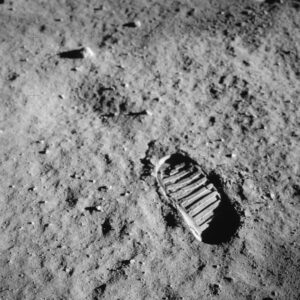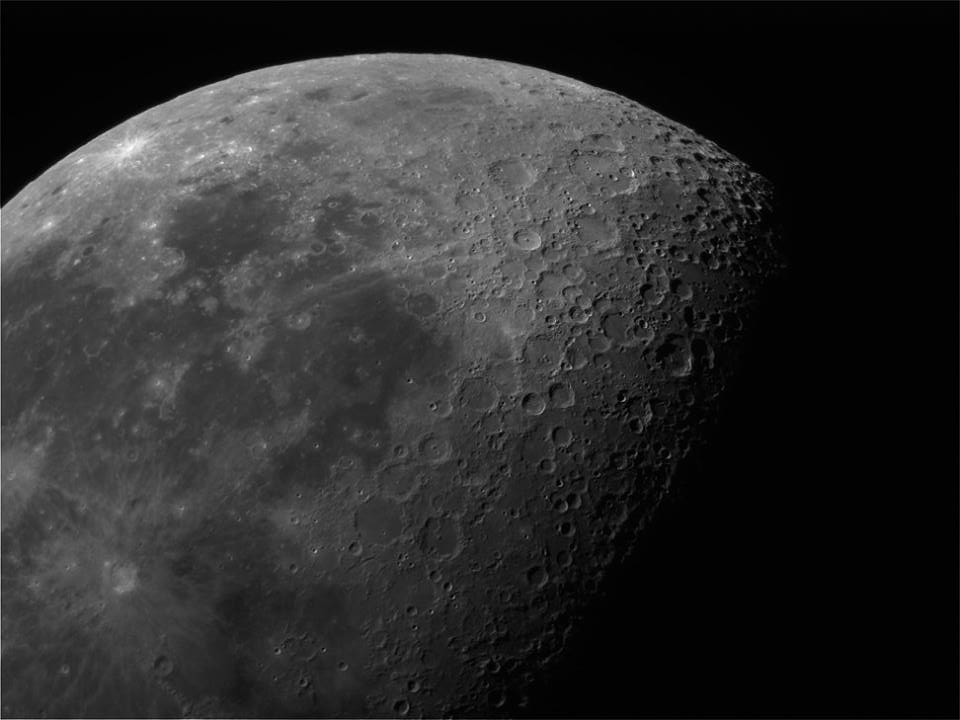It was a Sunday, and despite all the chores, George’s day flew by as each second ground down the young boy’s patience. Every so often, peppered throughout the day, he looks up there and prays and wonders knowing touchdown is approaching, adding new wind to his hustle. There’s a strangeness about this day, something unable to be captured in words. Few days in all of history carry such weight as they do this one, where the entire weight of space is placed on the shoulders of humankind alike whether they like it or not.
George hears his father give the signal just as he finishes cleaning the last square inch of his room. He takes off. Arms out, barrelling towards the family room with all his might, using every bit of bridled excitement to power his legs, the tedium of the day’s chores fuelling his increasing velocity. The stairs are approaching. He needs to be careful but there’s no time. He hears mission control in his ear screaming for caution, but he knows better – there’s no way he’s missing this, he’s got to get there on time. Warming up with one step at a time, he quickly pushes for two, before doubling it again. Heart pumping, eyes wide, zipping looks from foot to foot, he tries to catch the path of each placement to make sure it’s true, he can’t afford a slip-up. The greatest hurdle approaches, the last half dozen steps and he boldly skips them entirely! retracting his wings, he jumps for his life to land on the floor in a roll. He makes it. Springing back to his feet and extending his wings once more he’s off, blisters his feet as he charges forward, barely given time to catch one’s breath.
Mission control congratulates him as he breaks through to the family room, but the congratulations fall flat, and the thickness of the earth’s atmosphere is gone. George looks at his family but none acknowledge him, they’re all plastered to the television.
“They’ve actually done it…” his father whispers. “The eagle has landed.”
Just like that the vacuum in the room captures George’s attention, the television has created a portal directly to the moon, a signal coming from a distance thirty times the size of the earth itself. He slowly walks over and sees his first glimpse of black and white video of the moon and feels the weightlessness of space. Laughing, he tells Mission Control he’s thankful the suit is holding tight.
Should he lie down to watch this? No, there’s too much dust, too much excitement coursing through his veins. There, out there right now, is a man standing on the periphery of a new era. The seconds shrink as two men redefine the saying “it’s like landing on the moon” from an impossibility to a milestone of human ingenuity, determination, and hard work. But in that family room, void of breath, dying of anticipation, there’s something special occurring – a wholly human miracle. Inside George, as he watches Neil Armstrong, specific emotions are mixing that will change his physiology; excitement we’ve already listed, admiration is another, wonder and intrigue throw themselves in as well, but last and most important of all is a craving.
With his world shrunk to such a concentrated point through this portal to another world, he forgets his family, forgets the pictures of holidays and happy memories hanging on the wall, forgets his friends, schoolwork, toys, crush, everything is pushed out as a singularity of emotion and desire begin to form much like a galactic star, drawing in its surrounds, building and compressing itself into existence from a malaise of nothingness. In this bright mind, watching the culmination of humanity’s striving towards a goal, a dream is forming.
And again, as he watches Neil Armstrong get the go-ahead from Houston, he knows unconsciously this man, a focal point of thousands of people sharing a single goal, is making history, etching his name into the minds of a generation. For George, Neil Armstrong is truly Somebody – and then, the young boy hears the words that captivate the rest of his life.
“That’s one small step for man, one giant leap for mankind.”
– Neil Armstrong

The goosebumps flush George’s system cold, he isn’t blinking, and his heart rate slows. There’s a clarity to what’s happening in this moment – a question seemingly posed to everyone watching, as if to say, we’ve made it this far, will you carry us higher still? For George, the question crystalises the singularity into reality. In that moment, George decides when he grows up he’s going to be an astronaut, he wants to see the moon for himself and then carry on further.
That’s George’s answer but compared to the realm of aspirations in adult life, being so young, it comes from a place of innocence – he wants to be an astronaut because it’s the coolest thing he can imagine, should he follow through with this desire, he must navigate a deceptive and intangible network of influences and hurdles. Should his passion be strong enough, with just the right set of circumstances and fortune, he will achieve his dream. But much to the disbelief of many adults, aspirations tend to have a way of getting twisted, mixed up in different ideas, such as the ideal of being “Somebody”, which negates the purity with which a youthful mind aspires. Within the mind of an elder, a soul that has seen many ideals corrupted, there exists a belief that aspirations make for the most corruptible aspects of human experience.
We may ask in George’s case, how is a dream to maintain its innocence within a world of responsibilities and politics?
Now, over fifty years after first landing on the moon, this monumental beacon of what human potential can achieve still captures the imagination of generations of innovators, explorers, and dreamers. And so, with a dream appearing so pertinent to the concept of being “Somebody” in this day and age, there are a handful of preliminary questions that must be asked that, in my eyes, are worth asking if a dream is to maintain its so-called purity. These questions being:
- What is a dream?
- What does it mean to have a dream?
- What defines being “Somebody”?
- Why at some stage in our life, particularly adolescence, do we wish to be a “Somebody” at all? Where does the desire come from?
- Who defines being “Somebody”?
- Is today’s definition of “Somebody” different to that of the past?
- Why in particular, is the achievement of a dream so heavily tied to becoming “Somebody”?
- On the grounds of having a dream – who’s dream is it?
These questions are tied together in innumerable ways. Whether there are conclusive answers to them there’s no way of telling, but nonetheless, on the grounds that to not probe them would result in continued obscurity on what I feel should be considered prominent issues in today’s day and age. Thus, for this project, I wish to embark on exploring the concepts of possessing a dream and its relation to being “Somebody”.
